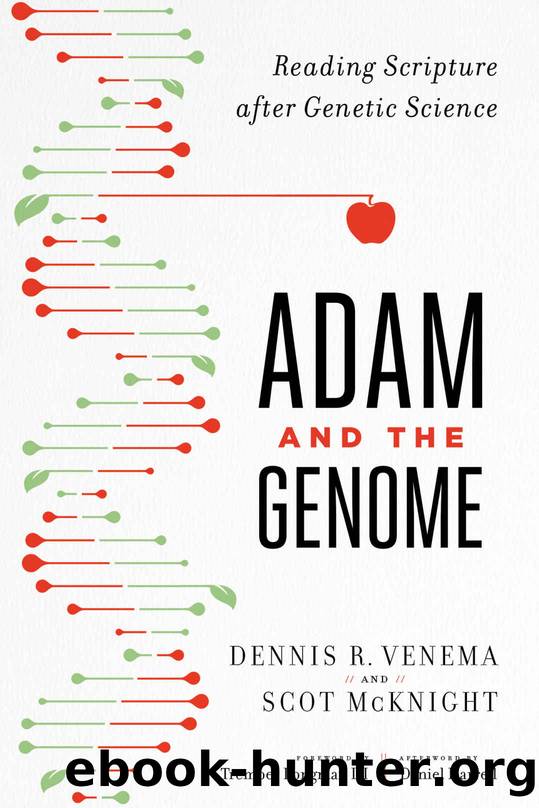Adam and the Genome: Reading Scripture after Genetic Science by Scot McKnight & Dennis R. Venema

Author:Scot McKnight & Dennis R. Venema [McKnight, Scot]
Language: eng
Format: azw
Tags: Bible and evolution, Genetic engineering—Religious aspects—Christianity, Genomes, REL106000, Human beings—Origin, Adam (Biblical figure), REL006080, Creationism
ISBN: 9781493406746
Publisher: Baker Publishing Group
Published: 2017-01-30T16:00:00+00:00
A Third Story: Atrahasis10
My favorite extrabiblical account about creation and humans, originally from Sumer but which spread around to other cultures, is called Atrahasis (after its main character).11 The connections of Genesis to Atrahasis are far more numerous, leading some (with caution) to suggest that Genesis 2–8 is Israel’s Atrahasis. I want to begin by quoting the opening of this text to give an impression of its worldview. The world is populated only by the gods, divine warriors, and divine elders, and the warriors find the chores too much.
When the gods like men
Bore the work and suffered the toil—
The toil of the gods was great,
The work was heavy, the distress was much—
The Seven great Anunaki
Were making the Igigi suffer the work. . . .
Excessive [. . .] for 40 years
[. . .] they suffered the work night and day.
They [were complaining], backbiting,
Grumbling in the excavation . . .
“[Enlil], counsellor of the gods, the hero,
Come, let us unnerve him in his dwelling!” (I.i.1–6, 37–40, 45–56)
Their pain causes Enlil to weep, so the solution is a new order of beings. Ea-Enki settles with them by creating workers (humans) who will do the work the divine warriors no longer want to do. As with similar stories in the ancient Near East, the gods are bothered by the noisy humans, so they send a flood to destroy them. Again, all of this sounds like themes in Genesis 1–11, with both fascinating similarities and yet profoundly different theological ideas. What matters to us most especially is what is said about humans as they are created.
They summoned and asked the goddess,
The midwife of the gods, wise Mami . . .
Create Lullu [worker] that he may bear the yoke,
Let him bear the yoke assigned by Enlil,
Let them carry the toil of the gods. (I.ii.192–93, 195–97)
Humans, then, are created because the divine assembly is lazy, so the gods can enjoy their leisure. The task of humans in this text is to work for the gods. One has to think that the Genesis 3 account of males working the land would have been heard by some in the ancient Near East as an echo of other creation narratives.
The creation of humans is told in three different ways in Atrahasis, but notice the presence of clay in the following passage:12
Nintu opened her mouth
And addressed the great gods,
“It is not possible for me to make things,
Skill lies with Enki.
Since he can cleanse everything
Let him give me the clay so that I can make it.”
Enki opened his mouth
And addressed the great gods,
“On the first, seventh, and fifteenth day of the month
I will make a purifying bath.” . . .
From his flesh and blood
Nintu mixed clay. . . .
It proclaimed living (man) as its sign. (I.198–207, 225–26, 229)
A second account mixes the clay with the divine warriors’ and divine elders’ saliva, while a third account comes closer to the human norm—sexual intercourse produces seven males and seven females. These “workers” then free the gods from their labor. But the workers—humans—are so noisy that the god Enlil wants them destroyed.
Download
This site does not store any files on its server. We only index and link to content provided by other sites. Please contact the content providers to delete copyright contents if any and email us, we'll remove relevant links or contents immediately.
The Lost Art of Listening by Michael P. Nichols(7108)
Why I Am Not A Calvinist by Dr. Peter S. Ruckman(4031)
The Rosicrucians by Christopher McIntosh(3347)
Wicca: a guide for the solitary practitioner by Scott Cunningham(3024)
Signature in the Cell: DNA and the Evidence for Intelligent Design by Stephen C. Meyer(2855)
Real Sex by Lauren F. Winner(2832)
The Holy Spirit by Billy Graham(2745)
To Light a Sacred Flame by Silver RavenWolf(2651)
The End of Faith by Sam Harris(2612)
The Gnostic Gospels by Pagels Elaine(2372)
Waking Up by Sam Harris(2301)
Nine Parts of Desire by Geraldine Brooks(2259)
Jesus by Paul Johnson(2201)
Devil, The by Almond Philip C(2181)
Heavens on Earth by Michael Shermer(2168)
The God delusion by Richard Dawkins(2153)
Kundalini by Gopi Krishna(2076)
Chosen by God by R. C. Sproul(2034)
The Nature of Consciousness by Rupert Spira(1950)
